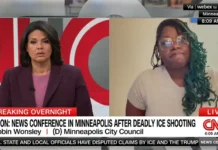
By Stacy M. Brown, Washington Informer
In data released earlier this year from the federal Home Mortgage Disclosure Act, major disparities exist in home loan approval rates between African Americans and whites.
Nationally, the purchase mortgage denial rate for Black homebuyers is twice as high as the denial rate for the overall mortgage borrower population in each of the nation’s 50 largest metros.
In D.C., approximately 32,238 loan applications were made or originated by mortgage lenders. About 16,227 mortgages were approved for white applicants and just 4,945 for Black applicants.
Census data collected by Prosperity Now revealed that the Black homeownership rate in the District of Columbia stood at 35.2% compared to 50.3% for white Americans.
A new report from Lending Tree found that, on average, 18% of Black homebuyers are denied a mortgage.
That counts as 9 percentage points higher than the average denial rate for the overall population of 9%.
“Racial barriers to homeownership in the U.S. are undeniable for many, with Black Americans often facing the most obstacles during the homebuying process,” Lending Tree researchers wrote.
“One obstacle Black Americans disproportionately face is getting their mortgage requests denied by lenders.”
The new report comes as African Americans continue to experience discrimination in the real estate appraisal market.
Most recently, a Black couple in Baltimore filed a lawsuit against an appraiser and a mortgage lender, alleging they received a severely undervalued appraisal for their four-bedroom home.
Following an initial appraisal of $450,000 – which already was less than the $622,000 government-assessed value, the home received a $750,000 appraisal from a different appraiser.
“The U.S. housing industry has a long history of racial discrimination – one that helped build the racial wealth gap and one that carries through today,” CBS Mornings reported.
In 2021, on the 100th anniversary of the Tulsa race massacre, President Joe Biden announced the launch of an interagency initiative to combat bias in home appraisals.
But real estate lending itself remains an issue.
The company analyzed purchase mortgage application records from the Federal Financial Institutions Examination Council’s Home Mortgage Disclosure Act 2020 data set — the most recent full data set available.
“Metros with the largest spread between mortgage denial rates for Black borrowers and the overall borrower population,” Lending Tree researchers found.
Among the key findings:
St. Louis, Boston and Jacksonville, Fla., see the largest percentage point differences between the denial rates for Black borrowers and the overall borrower population.
Across these metros, the denial rate for Black borrowers is an average of 13.36 percentage points higher than the denial rate for the overall mortgage borrower’s population.
San Francisco, Sacramento, Calif., and Seattle see the smallest percentage point differences between the denial rates for Black borrowers and the overall borrower population.
Though Black borrowers are more likely to be denied a mortgage in each of these metros, the average spread between their denial rate and the denial rate for the overall population is a relatively low 3.94 percentage points.
The report found that denial rates for Black borrowers are highest in Detroit, Miami, and Jacksonville, while they’re lowest in San Francisco, Seattle, and Sacramento.
Across Detroit, Miami and Jacksonville, the average denial rate for Black borrowers is 25.52% — more than double the average denial rate of 12.55% across San Francisco, Seattle, and Sacramento.
Though they can vary by metro, denial rates for Black borrowers are higher than 10% in each of the nation’s 50 largest metros, according to the report.
“Though it may be more difficult for some Black homebuyers to get approved for a loan, there are still ways for Black borrowers to help make their dream of homeownership a reality,” Lending Tree researchers insisted.
The researchers listed three tips that could make finding a lender and getting a loan easier:
- Shop around for a lender. If you’ve been denied a mortgage from one lender, that doesn’t necessarily mean there aren’t any others. By shopping around for a mortgage, you can potentially increase your odds of finding a lender and possibly even getting a lower rate on your loan.
- Consider different types of loans. Some types of mortgages, like those backed by the Federal Housing Administration (FHA) or the Department of Veterans Affairs (VA), can be easier to qualify for than other types of mortgages — especially for lower-income borrowers. If you’re having trouble getting approved for a standard mortgage, these options might help you access the funds you need to buy a home.
- Speak up if you feel discriminated against. It’s illegal in the U.S. to discriminate against borrowers based on race. If you feel like you’ve been the victim of discrimination, consider contacting your local housing authority or attorney general’s office or the Department of Housing and Urban Development (HUD) to file a complaint. Speaking out about discrimination can help yourself and others who may be going through something similar.
Click here for the full report.
This post was originally published on The Washington Informer.















